Discussing Razna Lake research and management issues
On March 21, a public information event was held at the Nature Education Centre of Nature Protection Administration, Razna, which the aim was to familiarise the public with the Razna Lake study and the current situation and organise discussions on lakes management issues. The event was attended by representatives of the Ministry of Agriculture, Environmental Protection Administration, the State Environmental Service Rēzekne Regional Environment Administration, the municipality of Rezekne and the county administrations, representatives of the “Environmental Solutions Institute” and the scientific institute “BIOR”, fishermen, fishermen and local residents.
In the first part of the meeting Dagnis Vasilevskis (Regional Administration of the Environmental Protection Administration Latgale) emphasized the protection of species and habitats in Razna Lake, with particular attention to canes and specially protected species, Razna lake protection and fish resources control issues.
The canes also play an important role in the diversification of landscape ecological niche, the provision of biodiversity and the reduction of nutrients from agriculture and forestry. They have a significant residence for several protected bird species, such as the big rebellion, the cane lley, the little orman, the barrels and the Seivi. In lakes nesting birds and fish is a mosaic, the surface area of closed and open water that decreases due to lake overgrowth. In order to prevent the massive emergence of large solid cane arrays and the shrinking of the surface of the open water, the kidneys need to be managed. The Razna lake also includes specially protected restricted species of fish - repsis, seedy and eel. The increased control work of the Nature Protection Administration is indicated by both the number of illegal fishing gear withdrawn and the number of persons called administrative liability. In the first three months of this year, the number of persons called administrative liability is almost as large as in 2016.
Rezekne municipality's senior environmental specialist Theresia crosses informed about the industrial fishing limits and their use in Razna lakes over the period 2010-2017. For 2017, the limit for fishing nets in Razna lakes is 17 175 m, of which 13 740 m (80%) is intended for commercial fishing while 3 435 m (20%) for self-consumption. Currently, 17 businessmen are engaged in commercial fishing in Razna Lake.
Visvaldis Noviks (Regional Environmental Board of the State Environmental Service) analysed the water holdings in the catchment area of Razna and their impact on the water quality of the lake. In Razna lakes, waste water collected and treated in the sewage treatment plants of the Chornajah and Lipušku villages, surface drainage waters from agricultural and forest lands, waste water from individual farms. The most topical issues to be addressed are the management of the private sector waste water and the efficient operation of existing sewage treatment plants.
Matīss Jagars (Foundation for Environmental Solutions) informed the study and conclusions of the study (a summary of the study published in “Rēzekne messages” on 17 March, on the website of Rezekne www.rezeknesnovads.lv, as well as in full with it can be found on the website of the Nature Protection https://www.daba.gov.lv/upload/File/DOC/ZIN_P_Raznas_ez_izpete_2016.pdf).
The main actions recommended to address the protection and management of Razna lake are the reduction of wastewater from villages, the prevention of malnutrition, the development of angling industry and the limitation of industrial fishing. Matīss Jagar emphasized that the management of Razna lake management issues requires the interest and support of local residents, municipalities and nature protection authorities.
Fishermen and fishermen who participated in the event were actively involved in the discussions. They asked questions that are important to them, such as the damage caused to fish resources by cormorants (cormorants) and how to limit them, on limits for industrial fishing, etc. It was proposed to develop the Razna Lake as an angling tourism object, reduce industrial fishing limits, revise the permit to navigate with a vessel using an internal combustion engine, the number and distribution between industrial fishing operators and tourism service providers.
The representative of the Ministry of Agriculture, Inese Bartule, pointed out that the proposal for a change in the fishing networks was entitled to be submitted by the local government, and if such a suggestion exists, it will be considered.
The Nature Protection Board has noted the main issues that will be addressed immediately after the meeting:
1) the institution will consult with the Latvian ornithological association in the issue of cormorant and provide information regarding possible solutions and actions for the restriction of the species.
2) The Razna Lake study will be sent to the scientific institute “BIOR” for evaluation and opinion. If necessary, the establishment of an “environmental solution institute” will be requested to clarify the study.
3) in cooperation with the municipality of Rezekne, the local government will seek the best possible solutions and compromises for the management of Razna Lake and inform the public regarding the progress of the process.
The Nature Protection Board expresses its gratitude to all participants in the meeting regarding the active participation, the provision of opinions and recommendations for the preservation of the natural values of Lake Razna.
The information was prepared by:
Elina Lake,
Head of Public Relations and Environmental Education Unit of the Environmental Protection Administration, Tel.: 26789874 elina.ezerina@daba.gov.lv
More information:
Regina Indriķe,
Head of the Nature Education Centre “Razna”, tel.: 29139677
regina.indrike@daba.gov.lv

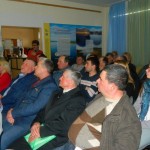
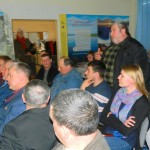
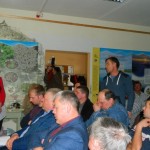
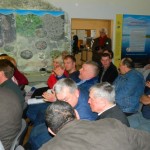
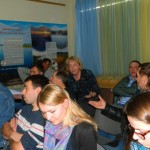
Photo: Anna Ranāne